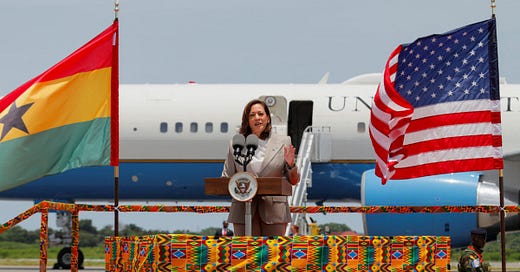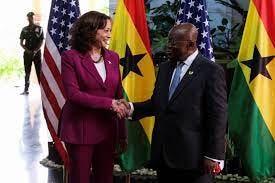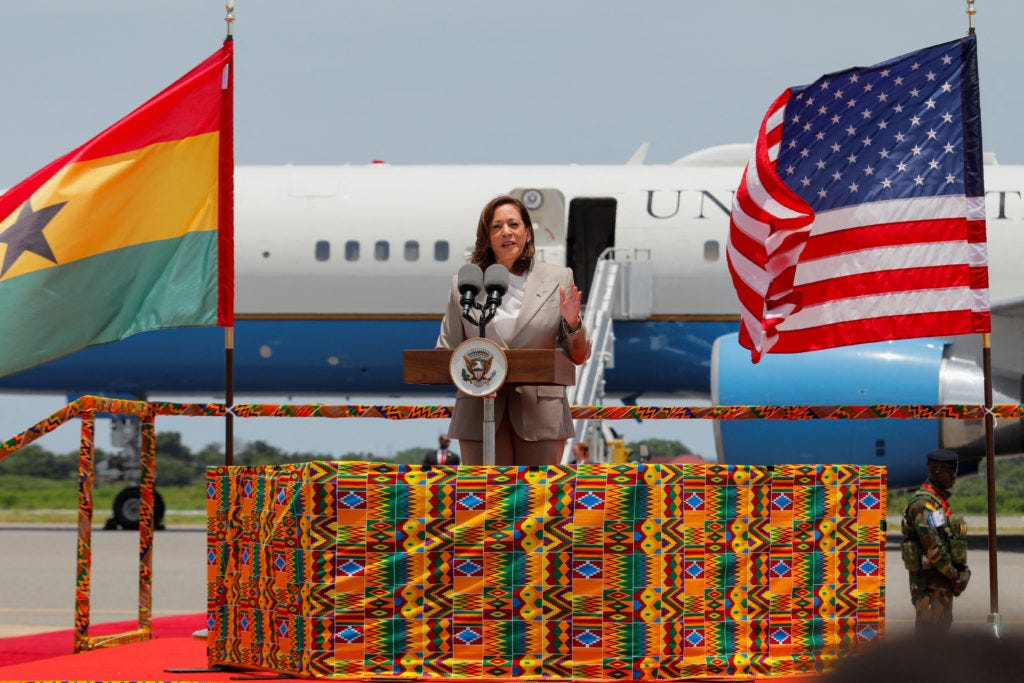Within the U.S. government, as well as within the diverse society of the United States, there are many distinct strands of ties between this country and the peoples of Africa. Probably most positive and reciprocal are the many cultural links as well as the links in common histories of struggles for freedom, with victories to celebrate as well as dreams deferred or betrayed.
See, for example, today’s other post More Songs Around the World.
But the destructive impact of state violence cloaked in a thick cloud of rhetoric about security and defense remains a central feature in those relationships.
In this AfricaFocus Notes I feature the commentary published last week by Washington Post columnist Karen Attiah. Born and raised in Texas to parents from Ghana and Nigeria, Attiah began her career as a journalist freelancing for the Associated Press in Curaçao, before being hired by the Washington Post. In addition to her work at the Post, Attiah has produced a still-relevant YouTube series of short video clips and is writing a book about Jamal Khashoggi, who she covered for the Post.
Also below are short excerpts from a new first-hand report from Niger on U.S. military intervention in the Sahel by Nick Turse. Turse has been providing investigative reporting since 2015 on U.S. military intervention in Africa, in addition to his prior work on Vietnam. His books include Tomorrow’s Battlefield: U.S. Proxy Wars and Secret Ops in Africa (2015).
See also the related commentary by Jake Werner in Responsible Statecraft on “What Biden means when he says we’re fighting ‘global battle for democracy’.”
Bill (William) Minter, Editor, AfricaFocus Notes
Kamala Harris goes to Africa. Color me unimpressed.
by Washington Post columnist Karen Attiah
Sign up for free weekly newsletter by Karen Attiah
In July 2009, I had the privilege of being in Accra during Barack Obama’s first visit to sub-Saharan Africa as president. I was a young, idealistic Fulbright scholar studying in Ghana, and I was asked by the U.S. Embassy to be on-site during Obama’s visit to a hospital.
The historic trip was rich with symbolism: Obama, the first Black U.S. president, the son of a Kenyan man, visiting the first sub-Saharan African nation to gain its independence. I remember the electricity across the country ahead of his arrival. People were on a democratic high, in a sense, proud that their closely watched 2008 presidential election had unfolded without violence or political unrest.
There were posters of Obama all over Accra, and local textile artists made ceremonial cloth in his honor. In a rousing speech to the Ghanaian parliament, he spoke of Africa being a vital part of an interconnected world. “The 21st century will be shaped by what happens not just in Rome or Moscow or Washington,” he said, “but by what happens in Accra, as well.”
This week, we saw another historic first: Vice President Harris became the first Black, female vice president from the United States to visit Africa, on a nine-day journey with stops in Ghana, Zambia and Tanzania.
But symbolic firsts go only so far. When it comes to Harris, to borrow words from the great B.B. King: The thrill feels gone. Read on, and I’ll explain why.
Global Radar, Part 1: In Africa, the U.S. doesn’t walk the walk
After Obama visited Africa, he presided over a strategy toward the continent heavily dominated by military concerns. Under his administration, the United States Africa Command expanded at a lightning pace. Between 2008 and 2014, the journalist Nick Turse reported back then, the number of operations, programs and exercises carried out by the U.S. military increased more than 200 percent. And although Obama claimed he did not want American military boots on the ground to deal with threats in far-flung parts of the world, the president increasingly relied on U.S. Special Operations forces to handle security operations; he sent nearly 300 such troops to Cameroon, for instance, and used them in Somalia in the fight against the terrorist group al-Shabab.
Cut to 2016, and the world watched as the United States elected Donald Trump president, a man who later called African nations “shitholes,” imposed nonsensical travel bans on a number of countries, and went on to virtually ignore the continent when it came to foreign policy priorities.
So much for all that hope, huh?
On top of Trump’s anti-Africanness, a long-standing complaint about U.S. policy relations in the past two decades has been that Washington has largely seen the continent not as a true partner, but as an arena full of threats to be contained. The United States has poured billions of dollars into counterterrorism efforts, which have included assistance to militaries fighting extremist groups such as Boko Haram, in West Africa, or al-Shabab, in the Horn of Africa region.
During Harris’s trip to Ghana, she continued this trend, signaling that the United States would invest $100 million for stabilization and defense in West Africa, with an emphasis on supporting fights against extremist groups in the Sahel.
Governance, development and human progress cannot happen without peace and security. But the problem with an Africa policy dominated by the interests of the U.S. national security apparatus is that money, training and weapons often go to militaries accused of egregious human rights abuses, including rape, torture and murder. Still, the United States pours money into counterterrorism and military initiatives, drowning out other types of investment.
As Rep. Sara Jacobs (D-Calif.) wrote in Foreign Policy in December, “only a small fraction of U.S. government investment on the continent focuses on cultivating good governance,” such as “reforms that seek to foster an independent judiciary, expand access to justice, make government transparent, counter corruption, and improve civil service.” In 2020, she noted, “U.S. investments in democracy, rights, and governance were around 5 percent of the government’s overall investment in sub-Saharan Africa.”
So, Harris’s announcement of major support for defense initiatives is no different from the arguably questionable security priorities of her political predecessors. This is one of those instances when it feels hard to cheer on the symbolism of a Black female first, when all that Black female is doing is carrying out national security priorities set by a bunch of (mostly) White men.
Global Radar, Part 2: The dark side of U.S. influence
Harris did at least address LGBTQ rights during her stop in Ghana. “I feel very strongly,” she said, “about the importance of supporting the freedom and supporting the fighting for equality among all people, and that all people be treated equally.”
Yet although she praised Ghana for its democratic progress, the country has backslid on the social rights front — as have other African nations.
Last year I wrote about how a horrible anti-LGBTQ bill was introduced into the Ghanaian parliament, alarming the human rights community. And last week, ahead of Harris’s trip, Uganda passed a draconian anti-LGBTQ bill, under which certain acts of “aggravated homosexuality” can be punished with the death penalty. The bill is a resurrected version of the infamous “Kill the Gays” bill, which was first introduced in 2009, later revised to remove the death penalty, and signed into law by President Yoweri Museveni in 2014, before it died in court on a technicality. Museveni is expected to sign the new bill into law.
The horrifying thing is that in both countries, the threat is coming from us — namely, American evangelical groups that have been pushing homophobic agendas in African nations for years.
That is not a new revelation. I wrote about this influence while I was in Ghana last year, specifically how the U.S.-based Christian group the World Congress of Families had helped stoke anti-LGBTQ efforts in the country. The 2013 film “God Loves Uganda” also explored U.S. evangelical connections there.
According to Borgen Magazine, evangelical nongovernmental organizations in 2014 made up one-fifth of the nonprofits in Uganda and held about $2 billion in wealth — making the country incredibly vulnerable to those evangelical agendas that do God’s will by advancing an anti-LGBTQ agenda. These numbers might be old, but they come from around the same period the “Kill the Gays” bill was being developed and debated — and they speak to the relationship between evangelical influence and the legal climate in Uganda.
When it comes to “countering threats” to Africans’ lives and African democracy, it’s high time for the United States to respond to more than terrorism and economic maneuvering by China. Homophobia is also a dangerous threat — one the United States has been quite adept at exporting.
After After Two Decades of U.S. Military Support, Terror Attacks Are Worse Than Ever in Niger
by Nick Turse
Excerpts only: For full article see https://theintercept.com/2023/04/02/us-military-counterterrorism-niger/
NIAMEY, Niger — THE LOOK ON Miriam’s face was abject fear. Her pink, white, and green veil had mostly slipped from her head, and her dark eyes grew wide as she stared down at her lavender smartphone. In a flash, she pulled it to her ear. “Allo!” she said, her pitch rising as her other hand nervously cradled her chin.
In the courtyard of her family’s tree-lined compound in a well-to-do neighborhood in Niger’s capital, members of Miriam’s ethnic group had been describing jihadist attacks on their historic community in a rural region to the north. Now, the six or seven men wearing tagelmusts — a combination of turban and scarf worn by Tuareg men to provide protection from sun and dust — were also glued to their phones as chimes announced incoming texts and calls. Voices on the phones sounded panicked. There were gunshots, and a familiar roar rumbled through the desert scrubland 100 miles away. At any moment, relatives warned, they expected an attack by the “motorcycle guys.”
Over the last decade, Niger and its neighbors in the West African Sahel have been plagued by terrorist groups that have taken the notion of the outlaw motorcycle gang to its most lethal apogee. Under the black banners of jihadist militancy, men on “motos” — two to a bike, their faces obscured by sunglasses and turbans, armed with Kalashnikovs — have terrorized villages across the borderlands where Burkina Faso, Mali, and Niger meet. These militants, some affiliated with Al Qaeda or the Islamic State group, impose zakat, an Islamic tax; steal animals; and terrorize, assault, and kill civilians.
Jihadist motorcyclists, Miriam reminded me, had thundered into the village of Bakorat on March 21, 2021. As described afterward by one of the survivors, the motos “swept into the village like a sandstorm, killing every man they saw. They shot one of my uncles in front of me. His 20-year-old son ran to save him, but he perished as well. We found them, slumped over each other.” Attacking in overwhelming numbers and with military precision, the jihadists executed men and boys while looting and burning homes. “They attacked the well like it was a military objective, opening fire on the dozens of men there. As they killed, I heard the attackers saying, ‘This is your time … for working with the state,’” another survivor told Human Rights Watch. “I collapsed, seeing the carnage … my father, my brothers, my cousins, my friends lying there, dead and dying.” Human Rights Watch said more than 170 people were massacred near Bakorat and Intazayene villages and nearby nomad camps that day. Miriam and her relatives put the number at 245.
U.S. Military Aid
In 2002, long before motorcycle attacks became commonplace in the tri-border region of the Sahel, the United States began providing Niger with counterterrorism assistance. The U.S. flooded this country with military equipment, from armored vehicles to surveillance aircraft. Since 2012, the tab to U.S. taxpayers is more than $500 million and climbing, one of the largest security assistance programs in sub-Saharan Africa.
…
In fact, Niger hosts one of the largest and most expensive drone bases run by the U.S. military. Built in the northern city of Agadez at a price tag of more than $110 million and maintained to the tune of $20 to $30 million each year, Air Base 201 is a surveillance hub and the lynchpin of an archipelago of U.S. outposts in West Africa. Home to Space Force personnel, a Joint Special Operations Air Detachment, and a fleet of drones — including armed MQ-9 Reapers — the base is an exemplar of failed U.S. military efforts in this country and the wider region. With terrorism skyrocketing in the Sahel while the U.S. pours hundreds of millions of dollars into security assistance, base construction, and troop deployments, this drone outpost — built to enhance security in the region — can’t even protect its own contractors and the U.S. tax dollars that keep it running. Less than a mile from the base’s entrance, as The Intercept recently reported, bandits conducted a daylight armed robbery of base contractors and drove off with roughly 24 million West African CFA francs late last year.
U.S. troops in the country also train, advise, and assist local counterparts and have fought and even died — in an ambush by ISIS near the village of Tongo Tongo in 2017. Over the last decade, the number of U.S. military personnel deployed to Niger has jumped more than 900 percent from 100 to 1,001. Niger has seen a proliferation of U.S. outposts that includes not just the huge drone base in Agadez, but also another one in the capital, at the main commercial airport. You can sit in a departure lounge and watch drones land and take off.
Last month, U.S. Secretary of State Antony Blinken met with Niger’s President Mohamed Bazoum and decried the growing regional influence of the Russian mercenary Wagner Group. “Where Wagner has been present, bad things have inevitably followed,” said Blinken, noting that the group’s presence is associated with “overall worsening security.” The U.S. was a better option, he said, and needed to prove “that we can actually deliver results.” But the U.S already has a two-decade record of counterterrorism engagement in the region — and “bad things” and “overall worsening security” have been the hallmarks of those years.
See full article at https://theintercept.com/2023/04/02/us-military-counterterrorism-niger/
Latest links noted * Randall Robinson * Cyclone Freddy Hits Southeastern Africa
AfricaFocus Notes is a reader-supported publication. To receive all new posts, consider becoming a free subscriber and sharing this with friends as colleagues. Paid subscriptions are also welcome as support for this publication. However, no post will be hidden behind a paywall.







Thanks, Bill. I had my bookclub today on the Refugee experience. Very interesting, but I am just getting to read substack etc. The music is always delightful. The other news (as seems to be the case in all of this administration) is much to be expected. Lip service only to climate change, investment in meaningful development everywhere. Guns, blood, and more guns seems to be on the menu across the world. I wish a fraction of the money spent on arms could be invested in education, health, and stimulus for small startups and ongoing enterprises..